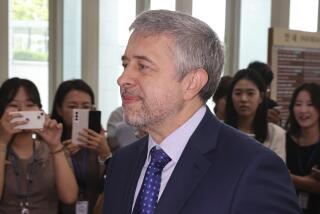Serbs Agree to Join Kosovo Peace Talks
- Share via
BELGRADE, Yugoslavia — Serbian leaders agreed Thursday to join ethnic Albanians in peace talks, but both sides in Kosovo’s conflict insist they won’t drop demands that threaten to block a deal to end the bloodshed in the separatist province.
After a daylong debate peppered with attacks on the U.S. and NATO, Serbia’s parliament voted 227-3 in favor of sending a delegation to the peace conference, set to begin Saturday near Paris.
But Serbian leaders rejected the deployment of foreign troops in Kosovo, a predominantly ethnic Albanian province of Serbia, to police any agreement. The North Atlantic Treaty Organization is laying the groundwork for a peacekeeping force, which is likely to include U.S. soldiers.
“We don’t accept the presence of foreign soldiers on our territory under any excuse of implementing any agreement that is reached,” said one article in a 12-page resolution approved by parliament.
It also condemned “in the sharpest terms” NATO’s threats to bomb Serbian forces if their leaders do not reach a peace agreement, calling the threats a violation of the U.N. Charter because NATO didn’t get approval from the U.N. Security Council.
But hard-line positions here in Belgrade, the Serbian and Yugoslav capital, have a history of collapsing under foreign pressure, and Thursday’s vote was another about-face by leaders who had always insisted that Kosovo was an internal matter. Serbia is the dominant republic of what remains of Yugoslavia.
Yugoslav President Slobodan Milosevic has bowed so many times to save himself since Yugoslavia began to disintegrate in 1991 that few would be surprised to see him do it again over Kosovo, even though Serbs call it their heartland.
That might sound like political suicide anywhere else, but not in Milosevic’s Serbia, political analyst Predrag Simic said.
“He has been, by now, 11 or 12 years in power, and there have been so many critical situations where it was very tempting to say his political career was on the edge or over,” Simic said in an interview.
But if Milosevic signs on to the proposed peace accord, he will have to accept the thousands of NATO peacekeeping forces that will go with it--and after seeing NATO at work in neighboring Bosnia-Herzegovina, that must worry him, Simic said.
In Bosnia, about 30,000 NATO-led peacekeeping troops, and the European administrators they back up, in effect run the still-divided country as a protectorate, dictating solutions to even the smallest disputes.
“I think, most likely, it would happen in Kosovo if this kind of deal is done, and I don’t know what other kind of deal one can foresee,” Simic said.
Lawmaker Gorica Gajevic of the ruling Socialist Party denounced NATO as “the world’s policeman, rapist on duty” but said the government should participate in the peace talks to restate its case.
“We are taking one more step in order to solve problems peacefully, and to affirm in front of the world, one more time, the truth about Kosovo,” she told parliament.
Vojislav Seselj, the ultranationalist leader of the Serbian Radical Party and another deputy prime minister, called on Serbs to resist what he called American aggression.
Accusing the U.S. of committing “every crime since World War II,” he listed Hiroshima and Nagasaki, Vietnam, Cambodia and several Latin American countries as some of the victims.
“For Americans, international law matters only when it’s useful to them,” Seselj said. “When it’s not useful, they are violating it mercilessly.”
The Serbs plan to name their delegation today to the Kosovo peace talks at a chateau in Rambouillet, France, but few here expect to see Milosevic’s name on the list.
His absence will complicate negotiations because ethnic Albanian leaders, and Western diplomats who have tried to broker previous deals, agree that Milosevic makes all the decisions about Kosovo.
The Kosovo Liberation Army, or KLA, which has battled Serbian security forces in a devastating 11-month war, agreed Tuesday to take part in the peace talks along with ethnic Albanian political leaders.
The U.S. and its five European partners in the Contact Group that coordinates Balkan peace efforts hope the threat of NATO bombing will force the warring parties to accept an interim deal that gives Kosovo greater self-rule.
The agreement being pushed in Rambouillet would, among other things, allow Kosovo’s people to elect their own president and take control over their police, justice system, education, some taxes and economic development.
Belgrade would remain in charge of national matters in Kosovo such as defense, foreign policy, customs services and federal taxation, according to a draft of the peace plan.
The proposed accord would put off a final decision on Kosovo’s status for three years. Yugoslav authorities want it to spell out that independence then would be illegal unless all parties to a peace deal approve it.
But going into the talks, the KLA guerrillas are insisting that any agreement guarantee that Kosovo’s people can vote on independence in a referendum when the three-year transition ends.
That puts the rebels in direct conflict with Western governments, which agree with Belgrade that Kosovo must remain part of Serbia.
Any peace deal in France “cannot lead in further talks to independence or a third republic in Yugoslavia,” the Serbian parliament said in its resolution, seen here as Milosevic’s bottom line.
More to Read
Sign up for Essential California
The most important California stories and recommendations in your inbox every morning.
You may occasionally receive promotional content from the Los Angeles Times.













